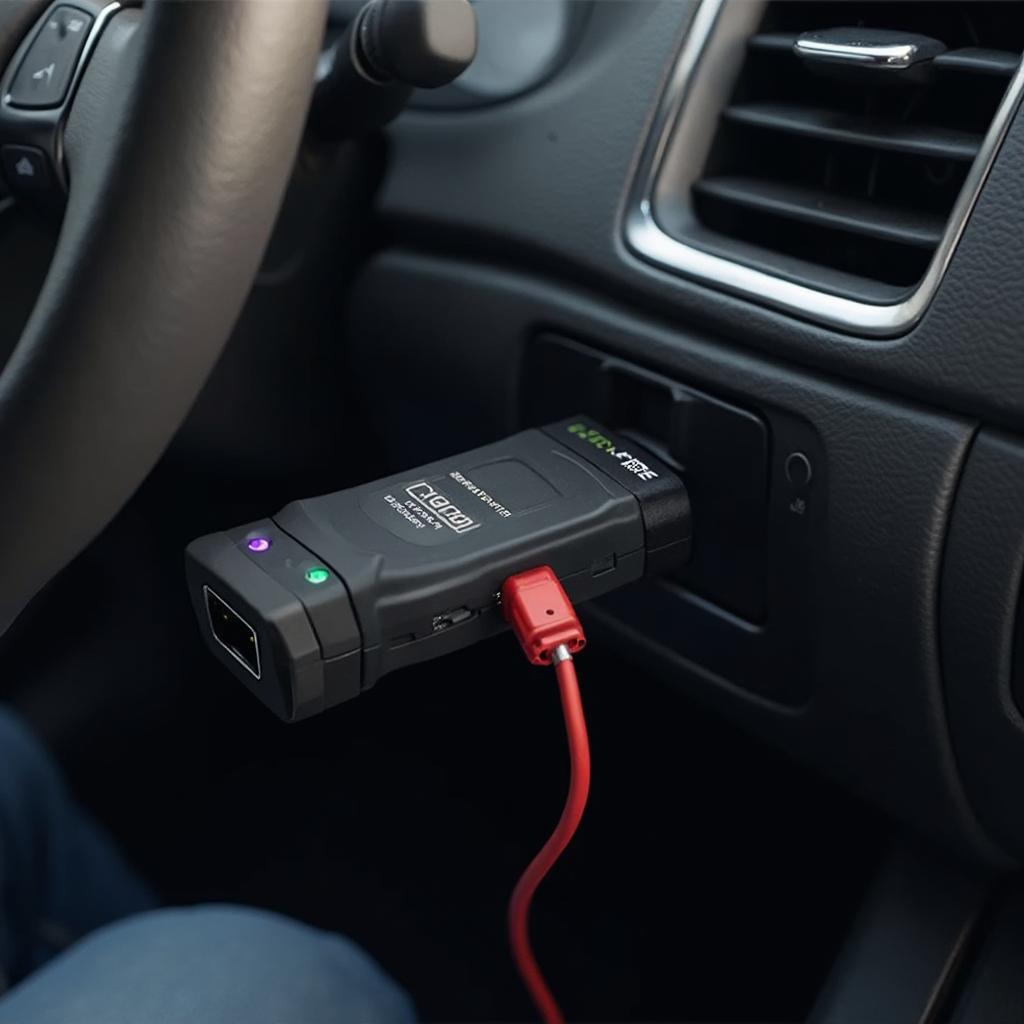Do OBD2 fuel savers work? It’s a question many car owners ponder as they search for ways to improve fuel economy. These small devices, often plugged into the OBD2 port, claim to optimize your car’s computer for better fuel efficiency. But do they live up to the hype? This article delves deep into the world of OBD2 fuel savers, separating fact from fiction. do obd2 fuel saver work We’ll explore the technology behind them, examine the claims, and ultimately help you determine if they’re a worthwhile investment.
Understanding OBD2 Fuel Savers
OBD2 fuel savers are marketed as devices that can improve your car’s fuel economy by modifying its engine control unit (ECU) settings. They supposedly learn your driving habits and then adjust parameters like fuel injection timing and air-fuel ratio to optimize performance and reduce fuel consumption. The manufacturers often promise significant fuel savings, sometimes as high as 25%.
Do OBD2 Fuel Savers Really Work? The Science and the Skepticism
The claims made by OBD2 fuel saver manufacturers often sound too good to be true. And, unfortunately, they often are. While the OBD2 port can access and modify some ECU parameters, it’s highly unlikely that these devices can deliver the promised fuel savings. Modern car ECUs are sophisticated and already optimized for fuel efficiency based on years of research and development. Simple plug-in devices are unlikely to improve upon these complex systems. Many experts consider these products scams, preying on drivers hoping for a quick fix to rising fuel costs.
Debunking the Myths of OBD2 Fuel Savers
One of the major issues with these devices is the lack of independent testing and verification. Most of the “evidence” supporting their effectiveness comes from anecdotal testimonials and dubious studies. There’s no credible scientific evidence to back up the significant fuel savings claims. eco fuel saver obd2 Furthermore, some of these devices may even negatively impact your car’s performance or emissions.
Alternative Ways to Improve Fuel Economy
If you’re looking to improve your fuel mileage, there are far more effective and proven methods than relying on an OBD2 fuel saver. These include:
- Regular maintenance: Ensure your car is properly tuned, with clean air filters and correctly inflated tires.
- Driving habits: Avoid aggressive acceleration and braking, and maintain a consistent speed.
- Reducing weight: Remove unnecessary items from your car to reduce its overall weight.
- Using cruise control: Utilize cruise control on highways to maintain a steady speed.
- Planning your routes: Avoid congested areas and choose the most fuel-efficient routes.
“Regular maintenance and mindful driving habits are the most reliable ways to boost fuel efficiency. Don’t fall for quick fixes that promise unrealistic results,” advises John Miller, Automotive Engineer at Apex Automotive Solutions.
Are OBD2 Fuel Savers a Scam? Examining the Evidence
Many experts believe that ultra fuel saver obd2 are indeed a scam. The lack of verifiable evidence, coupled with exaggerated claims, raises serious red flags. While some devices may marginally alter certain parameters, the impact on fuel consumption is negligible at best. Spending your money on proven fuel-saving methods like regular maintenance is a much wiser investment.
Conclusion: Do OBD2 Fuel Savers Work? The Verdict
So, do OBD2 fuel savers work as advertised? The evidence suggests otherwise. While the concept may seem appealing, the reality is that these devices are unlikely to deliver the significant fuel savings they promise. eco obd2 app Instead of relying on these unproven gadgets, focus on tried-and-true methods for improving fuel economy, such as proper maintenance and efficient driving habits. You’ll save more money and avoid potential harm to your vehicle.
FAQs
- What is an OBD2 port? The OBD2 port is a standardized diagnostic port found in most modern vehicles. It allows access to the car’s computer system for diagnostics and data retrieval.
- Can OBD2 fuel savers damage my car? While unlikely to cause significant damage, some poorly designed devices could potentially interfere with the car’s electronics.
- What are the best alternatives to OBD2 fuel savers? Regular maintenance, efficient driving habits, and reducing vehicle weight are proven ways to improve fuel economy.
- How can I tell if an OBD2 fuel saver is working? There’s no reliable way to verify the effectiveness of these devices without conducting proper fuel consumption tests over an extended period.
- Are there any legitimate OBD2 devices for fuel economy? Some reputable OBD2 devices can provide valuable data about your driving habits and fuel consumption, but they don’t magically increase fuel economy.
- Where can I find reliable information on fuel-saving tips? Consult your car’s manufacturer or reputable automotive websites for evidence-based fuel-saving advice.
- Is the eco obd2 a scam? Many experts believe so, due to the lack of scientific evidence and exaggerated claims. is the eco obd2 a scam
Common Scenarios and Questions:
- My car is older, will an OBD2 fuel saver work better? No, older cars generally have simpler ECUs and are even less likely to be impacted by these devices.
- I saw a positive review online, does that mean it works? Online reviews can be misleading. Look for independent testing and verification from reputable sources.
Further Reading:
- Check out our article on “Eco OBD2 App” for more information on mobile applications related to fuel economy.
Need support? Contact us via WhatsApp: +1(641)206-8880, Email: [email protected] or visit us at 789 Elm Street, San Francisco, CA 94102, USA. We offer 24/7 customer support.

